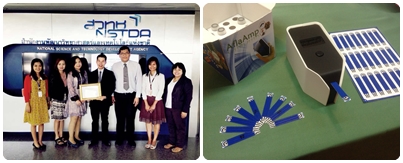The National Research Council of Thailand (NRCT) recently made an announcement of NRCT Awards. The awards announced this round were 2014 Outstanding Researcher Awards, 2014 Research Awards, 2014 Thesis Awards and 2015 Invention Awards. The following are the work of BIOTEC researchers that receives these prestigious recognitions:

The project on “The Development of DNA Microarray Technology to Address Poor Reproductive Maturation Problems in the Black Tiger Shrimp (Peneaus monodon)” was among the recipients of 2014 NRCT Research Awards. The technique of DNA microarray is applied to perform high throughput gene expression analysis in order to understand the reproductive mechanism in black tiger shrimp. The result of this study will lead to the development of diagnostic tool for shrimp maturation for breeding program. This work is conducted by BIOTEC Microarray Laboratory, led by Dr. Nitsara Karoonuthasiri.

The work on “Understanding, and Exploiting, the Contribution of the Immune System to the Therapeutic Efficacy of Oncolytic Virotherapy with Vesicular Stomatitis Virus”was selected for the 2014 NRCT Thesis Award. Dr. Phonphimon Wongthida, BIOTEC researcher in Virology and Cell Technology Laboratory, conducted this work as her PhD thesis at Mayo Graduate School under the supervision of Prof. Richard Vile. The study showed the role of both, innate and adaptive immune responses, in mediating VSV virotherapy. Firstly, innate immune signaling through the MyD88 adaptor protein, and subsequent production of type I IFN and IL-28, is critical to the anti- tumor therapy of oncolytic VSV in immune competent model. Secondly, adoptive transfer of antigen specific cells can be successfully combined with intra-tumoral antigen expressing oncolytic virus to treat both the locally injected tumor and also systemic tumors not injected with virus.

The work on “Post - Translational Membrane Protein Targeting by the Chloroplast Signal Recognition Particle” was selected for the 2014 NRCT Thesis Award. This work was conducted by Dr. Peera Jaruampornpan as her PhD thesis at California Institute of Technology under the supervision of Prof. Shu-ou Shan. The study aimed to understand how Chloroplast Signal Recognition Particle (cpSRP) and its receptor adapt to their unique requirements in efficiently transporting a family of highly abundant membrane proteins. Peera is now BIOTEC researcher working in Virology and Cell Technology Laboratory.

“Portable rapid and low cost aflatoxin sensor with LAMP-Electrochemical detection kit” was selected for 2015 NRCT Invention Award. This work is a collaboration between researchers from NECTEC and BIOTEC. Leading the BIOTEC team is Ms. Wansika Kiatpathomchai, Head of Bioengineering and Sensing Technology Laboratory. The kit operation is based on the measurement of current response as a result of electrochemical reaction from aflatoxin on an innovative graphene-based test stripe fabricated by printing technology. The current is then accurately converted into aflatoxin concentration and output on the built-in LCD display. The disposable graphene electrode offers high efficiency, high detection sensitivity and wide aflatoxin detection range 0-80 ppb (maximum contaminated level of aflatoxin = 20 ppb).
